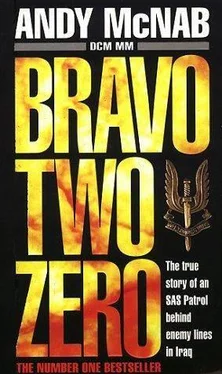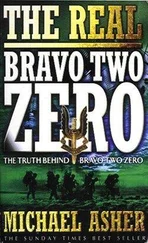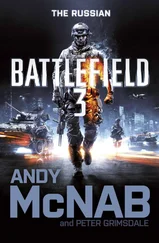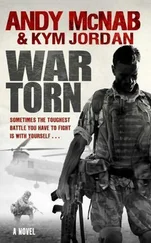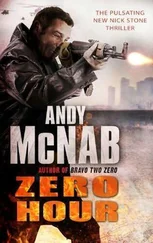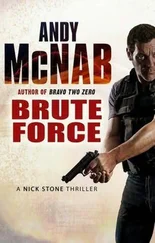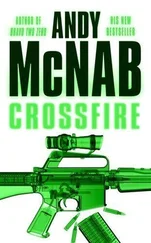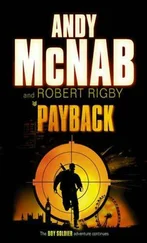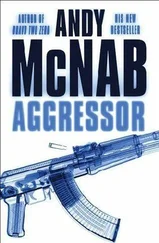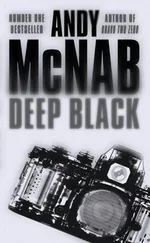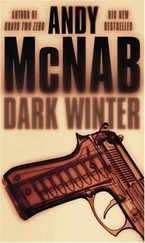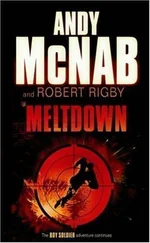But here was Richard Pryor telling me we were now best mates, and it was hard to take.
“You’ve done well, Andy. This is good.”
I knew I was right to have taken their threat as real. The way they’d been treating us, I wouldn’t have put it past them to kill the ones in hospital. They’d had ten years’ practice at this sort of thing.
“Do you want a cigarette?”
“No, I don’t smoke. But my friend Dinger does.”
“Maybe we might be able to give him a cigarette one day.”
“Now that I’ve told you, is it possible that we can have some clothes and maybe some warmth? We are very cold.”
“Yes, this will be no problem, because now we are friends. You can go back to your cell now, Andy, and maybe things will change. Meanwhile, we’ll check on this.”
They put the blindfold and handcuffs back on, and took me back to the cell.
Half an hour later, they came back and threw me my clothes and removed the blindfold and handcuffs. But they hadn’t finished with their little games quite yet. As I tried to get dressed, they kept pushing me over.
I woke up still wondering whether I had done the right thing. I was lying in the same old corner. You seem to go to the same place all the time, maybe because it makes you feel more secure or more covered up.
The guards came in, accompanied by a sergeant major. He spoke very good English.
“Ah, Andy, Andy. Our friend Andy,” he said, his mouth full of pistachio nuts. “My name is Mr. Jihad.”
He spat shells on the floor.
“Good morning, Mr. Jihad.” I knew that couldn’t be his name, but I went along with it.
“It’s good to see that you’ve got your clothes back now, and you are feeling better. You are feeling better?”
“Yes.”
“Unfortunately we can’t give you any medical attention because we don’t have it ourselves. The children are dying in your bombing; we have to give it to them first. Do you understand?”
“Of course, I understand.”
“It’s Bush and Thatcher and Major. They’re stopping all medical aid coming in. But we do have some food for you this morning. You would like some food?”
“Thank you very much, I would like some food.”
They brought in water and a one-inch cube of margarine in a paper wrapper. I opened it up and started eating.
“About escape, Andy. You’ve been here a long time. You may be feeling that you want to escape. Escape would be very, very useless; it would be no good for you. You’re in Baghdad. There’s nowhere for you to go. And we’re friends now, aren’t we, Andy?”
I nodded and agreed, my mouth slippery with grease.
“Let me show you what happens when people try to escape.” Mr. Jihad lifted up his trouser leg and showed me a huge scar. “When I was a young man, I was in prison in Iran for six months. My friend and I tried to escape. We got away but we were captured the next day. They took us back to the camp and decided to make an example of us. So they got us on the floor, face down, and two soldiers stood over us with their rifles and bayoneted our legs through the back of the knee. They forced our kneecaps right out. If you try to escape, Andy, I will have to do the same to you.”
I wasn’t going anywhere. I could just about stand up.
I smiled. “I just want to go home to my family.”
“This cell is very dirty, you know, Andy. You people might live like this, but we Muslims are very clean. You will clean this up.”
“How do I do that?”
“You clean it with your hands, Andy. Come on, clean this place up. We do not live in this mess.”
He stood over me and watched as I got down on my hands and knees and scooped all my shit into a pile. Then he gave me two bits of cardboard to put it on, and they left the cell.
I looked at the walls and saw fresh bloodstains on the surfaces. They were mine. At least I’d added to the ambience of the cell.
I began to feel apprehensive. What would happen now? Would we go away? Would we stay there? Richard Pryor had said to me: “England is a nice place. I was there fifteen years ago. I was at college in London. I know London well. Maybe one day you’ll get back.” Yeah, maybe.
Some time in the afternoon of the 6 th, they came in and handcuffed and blindfolded me again. They picked me up, and I thought I was off for another interrogation. I went outside and started to follow the old familiar route, but this time we took a strange turning, and I found myself being put into the back of a vehicle.
I leaned forward, head down to release pressure on my hands. It was lovely and warm in the car, and I could hear the birds singing. It was gorgeous weather. I was full of dread.
The car was big. An old American thing, I assumed, like they all seemed to be.
“If you try to escape,” somebody said, “we will kill the other two. And if they escape, you will be killed. So you see, it is pointless.”
Did that mean that Dinger and Stan were coming too? I waited for someone else to get into the car, but no one did. Both doors were closed. I was alone in the back. There were two fellows in the front, and they both spoke excellent English.
“Do you know where you’re going now, Andy?” the driver asked as we set off.
“No, I have no idea.”
“We’re taking you to the British Embassy. You will now be going home to your family. No problems.”
“Thank you very much.”
They started laughing to themselves and I went along with it, playing the idiot.
“No, we are only joking, Andy. You’ll be going home one day, but not yet. Not for a long time yet.”
We drove for a few minutes in silence.
“Have you heard of Ali Baba?” one of them asked.
“Yes, it’s an old film which they play every Christmas. They always have Ali Baba and the Forty Thieves on.”
“Yes, well this is where you are. You’re in the land of Ali Baba, in Baghdad. The thieves of Baghdad. A very beautiful city. But no longer, because everybody’s dying. You people, you are coming in and bombing our places. Children are dead. Entire families are dying. It’s no more the great land of Ali Baba; it’s all demolished. But when we win, we will rebuild, no problem. Fantastic place. Ali Baba.”
I nodded and agreed. They turned on the radio and scanned through the stations. Every one sounded the same aggressive rhetoric or wailing Arabic songs. They were enjoying themselves, driving along with the windows open, not a care in the world.
I listened to the sounds of the city. We stopped at lights, hooted, and people gob bed off. Music blared out of shops; there was all the usual hustle and bustle of a city. The characters suddenly started laughing and chattering.
“We’re just looking at your two friends in front of us,” one of them said. “They are leaning against one another, sleeping. They must be very good friends.”
This was great. It confirmed that Dinger and Stan were with me. It was a fantastic feeling.
The boys started smoking and were very jovial. We drove on for another 30 minutes or so.
“Yes, we’re going to somewhere else in Baghdad.
You’ll enjoy this place. Very good place. We were only joking about the embassy.”
People reached in through the windows when we arrived at what they announced was the military prison, slapping me on the head, pulling my mustache. Nothing too serious, all very neighborly stuff.
I heard barriers being lifted, gates being opened. We drove forward a bit more and stopped. They got me out of the car and put a blanket over my head. I was led up to a door and along a wide corridor with concrete floors. There were echoes of talking, of bolts being opened and closed, the jangling of chains and keys.
This place wasn’t damp, but it was freezing cold. They led me into a cell. I was made to sit on the floor, and my handcuffs and blindfold were taken off. I saw soldiers dressed in olive drab and red berets, wearing the old ‘37 webbing-pattern belt and gaiters, all immaculately blancoed in white. They were military policemen. I spotted an officer and a couple of blokes in civvies. They closed the door and left me.
Читать дальше
